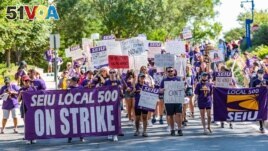03 September 2022
Those arriving at colleges this year might see office workers, researchers, or graduate assistants on strike. A strike is when workers decide not to do their job as a way to ask for more money or better working conditions.
That is what happened in late August at American University (AU) in Washington, D.C.
Linda Golden works in the career center at AU. She was one of about 500 staff members who stopped working to ask for a better contract. Golden said she and other workers wanted to be sure they could cover the cost of living in Washington, D.C. They also felt that workers were being asked to do more work because the school was slow to replace people who left for new jobs.

Workers march at American University as a way to pressure the school to work with their union on a contract. (Photo by Dylan Singleton)
At a large meeting for first-year students on August 26, many walked out when the university president began speaking. They gathered outside to support the striking workers, saying "pay your staff." Within two days, the university announced that it had reached a temporary agreement to pay the striking workers more.
Golden called the agreement "a step in the right direction." And she had a message for international students who might be in the U.S. for the first time.
"I think it's important for students coming to the U.S. to know that we have, as workers, the right to organize, to make a case for ourselves and to fight for better working conditions. Everyone deserves to make fair wages and earn a living. And when that's not the case, we also have a right, a legal right, to organize to demand improved conditions."
Forming a union
The rights that Golden describes have been in place since 1935 in the U.S.
That was the time Congress passed the National Labor Relations Act to provide workers with the right to organize, seek representation and fight for better working conditions. The law protects American workers who act together to address work conditions, with or without representation from labor unions.
When people think of labor unions, they usually think of people who are working in factories or coal mines. In recent years, workers at companies like Starbucks and Amazon are forming their own unions.
And some of the most important conversations about workers' rights are going on at American colleges among graduate students and those who play sports such as American football and basketball.
In the past, graduate students who also held jobs as teaching or research assistants received a small payment and reduced tuition for helping to teach or do research. Now, graduate and research assistants can ask for help from their unions if they feel like they are being treated unfairly.
There are unions representing them at Columbia, Harvard and New York University. In California, students at 10 schools in the University of California system became unionized in late 2021.
Athletes gain money, seek protection
The graduate assistants' success in forming unions has led college students who play sports to think about how they can organize to get more from the schools.
The Big Ten Conference is made up of major schools like Ohio State University, Pennsylvania State University and the University of Michigan. Recently, the organization signed a contract with several television broadcasters that will bring in $7 billion over the next seven years. The broadcasts will show games played by student/athletes who receive not much more than a small payment and tuition.
Dan Murphy writes about college football for ESPN. For years, Murphy said, there has been talk of a union in college football, but the last serious attempt failed in 2014.
Now that some student athletes are making hundreds of thousands of dollars on what is known as name, image and likeness agreements, they have more power than in the past. Murphy noted that some also have agents who help them with making deals.
"If college athletes could ever organize their voices and kind of act in unison, they would have so much leverage that the NCAA would have to sort of cave and really change their business model."
Murphy also noted that the unions might be able to help college athletes have more time away from their team or more time to rest after games.
"The NCAA has rules that you're supposed to only spend about 20 hours a week or so on your sport when you're in season. But no one really follows those."
Many workers in the U.S., however, will get the day off on Monday in honor of Labor Day, a holiday that started in 1882.
I'm Dan Friedell.
Dan Friedell wrote this story for VOA Learning English.
_______________________________________________________________________
Words in This Story
graduate –adj. relating to studies taken at a university after earning a bachelor's degree
staff –n. a group of people who work for an organization
deserve –v. used to say that someone or something should be given something
labor union –n. an organization of workers
tuition –n. the amount of money paid to a school for the right to study there
likeness –n. a drawing or photo of what a person looks like
unison –adj. doing something together at the same time
leverage –n. influence or power used to achieve a desired result
cave –v. to stop trying to resist something or give in